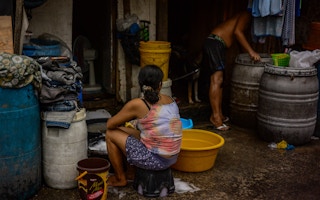In the three years since a private company took charge of the water supply in his home city in the Philippines, Rommel Pido says the flow from his taps has turned a murky brown and his bill has more than doubled.
Nowadays, residents “make do with this iced tea water from the taps”, Pido told Context by phone from his home in Bacolod, a city of 600,000 people in the Western Visayas region.
Angry at the deterioration, Pido and other residents filed a legal complaint seeking to nullify the 2020 joint venture agreement (JVA) that gave the lead role in city water operations to PrimeWater, a company owned by the family of the country’s richest man Manny Villar.
At the same time, the Philippines’ Commission on Audit (COA), an independent state body, issued a series of damning reports about water supply partnerships involving PrimeWater including the Bacolod deal.
The Bacolod case, which is being heard by a regional court, reflects growing unease and protests in the Philippines about the JVAs signed with PrimeWater in about 100 of the country’s 500 government-owned water districts.
The remaining 400 districts continue to operate without private sector participation, though several other companies including MetroPac Water Investments Corporation and Twin Peak Hydro Resources Corp. have signed more limited deals with water districts - mainly to partner on one-off projects.
The deals were enabled by a 2013 government policy that promoted public-private partnerships (PPPs).
But water rights advocates say the agreements are leading to the gradual privatisation of water districts across the country of 113 million, with the focus on profit leading services to slide at the same time as bills go up.
They say that violates people’s right to water, as established by the United Nations.
“
Despite limited financing, we want water districts to be self-sufficient. However, often, when they enter these agreements, we’re not consulted. We’re not part of the bargaining.
Vicente Homer Revil, administrator, Local Water Utilities Administration
“If the JVA (with Bacolod) becomes nullified, it should be a wake-up call for us that all public utilities should remain with the state or with the people,” said Wilson Gamboa, a former local official in Bacolod and staunch critic of the water deals.
Like many locals in the city, Pido said it was wrong to hand the provision of a vital service to a private company.
“All they care about is profit,” said Pido, who works at a community radio station, adding that his monthly bill had risen to 500 Philippine pesos (US$9.14) from 200 pesos prior to the deal. He says he also spends hundreds each month on bottled water now.
PrimeWater, which calls itself the country’s fastest-growing water company, did not immediately respond to requests for comment from Context, but last year it blamed the problems in Bacolod on the low production capacity of its reservoirs.
It said dirty water results from reservoir issues, maintenance activities, inconsistent supply of bulk water, and the accumulation of minerals and sediments inside pipes, vowing to make a series of improvements - from replacing pipelines to increasing water pressure.
Officials from the city’s water district did not immediately reply to requests for comment.
Safe drinking water
Water quality is a sensitive issue in the Philippines, where more than 22 million people lack access to safe drinking water, forcing them to buy bottled water for drinking and household use in a country with severe plastic pollution problems.
According to the United Nations, 2.2 billion people lack access to safely managed drinking water globally, with floods and droughts linked to climate change exacerbating the situation. Many more lack properly managed sanitation.
In 2020, Kaye Viray and her family were ecstatic to move from a rented apartment in Manila to their own modest home with a yard in Laguna province, about 50 miles (80 km) from the capital.
But when they poured their savings into the home, they had no idea that water supplies in the area were expensive and inadequate, she said.
“The water here is unusable,” said Viray, who lives in a Villar-owned housing development, which is also supplied by PrimeWater.
“Not even for cooking, bathing, or laundry. It has become a source of daily stress for us,” she said, adding that they are sent a monthly fixed rate bill of 260 pesos even if they do not use the murky tap water.
When they do, the bill soars - once reaching 1,000 pesos - far in excess of the rates set by the Local Water Utilities Administration (LWUA), a government body that oversees the development of water supply systems outside Manila.
Complaints by residents to the development’s managers have fallen on deaf ears, she said.








